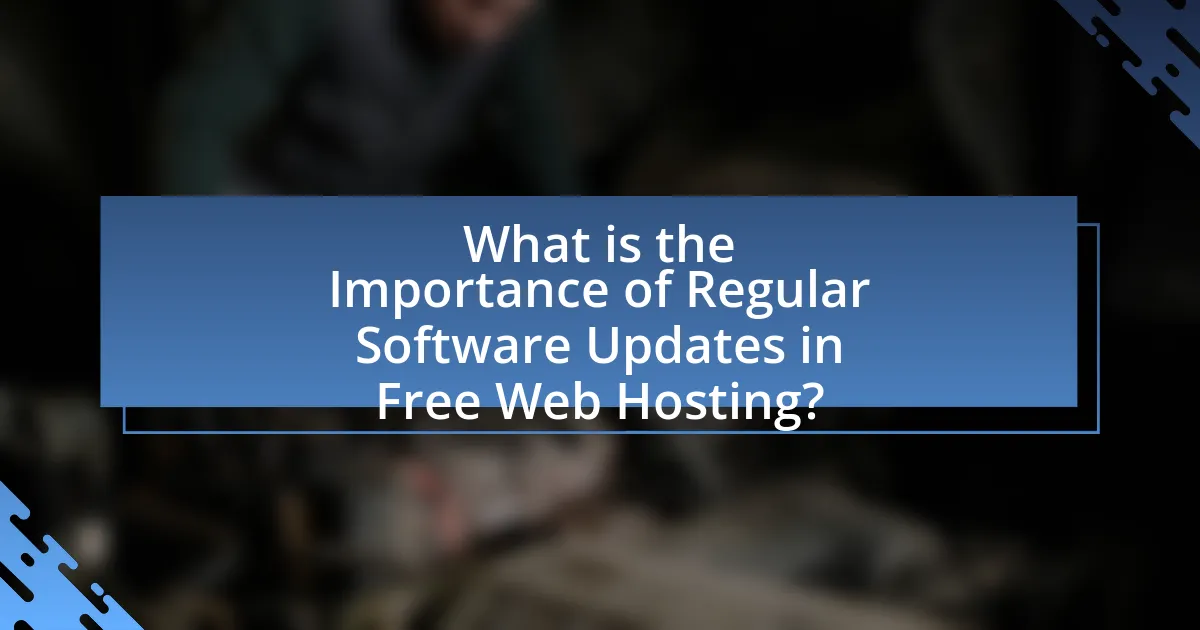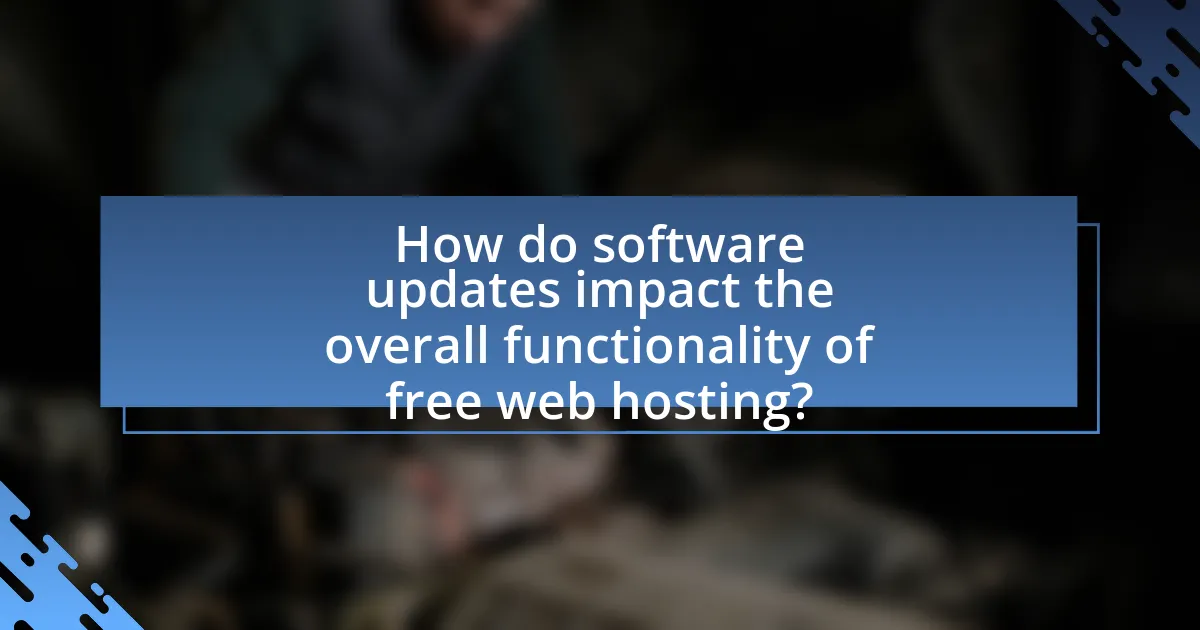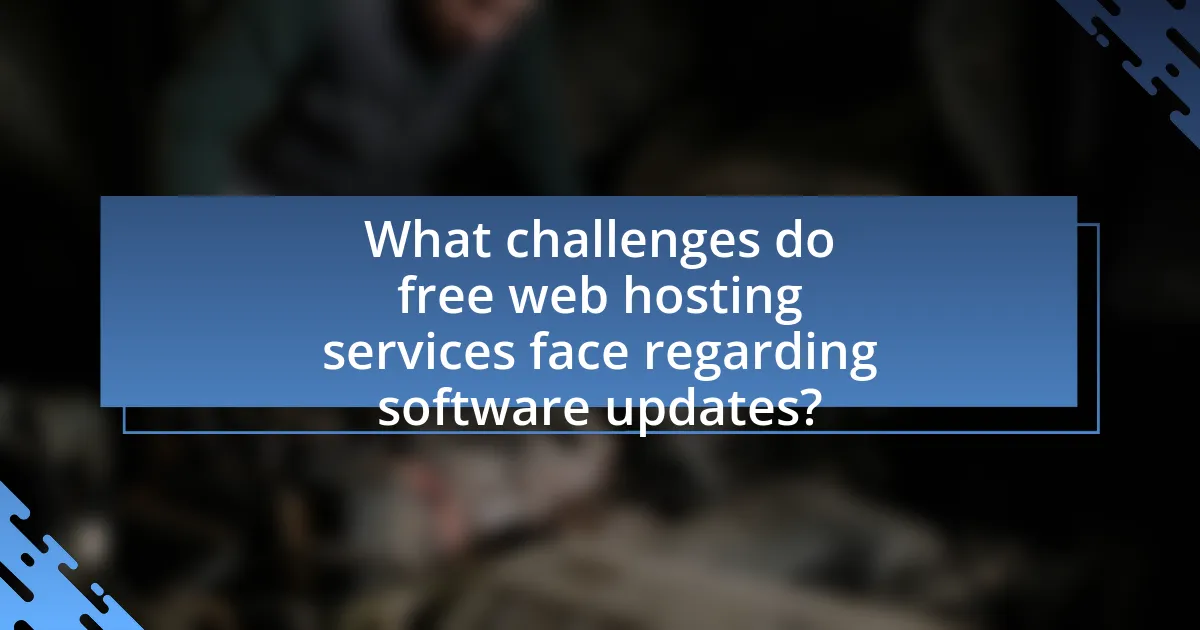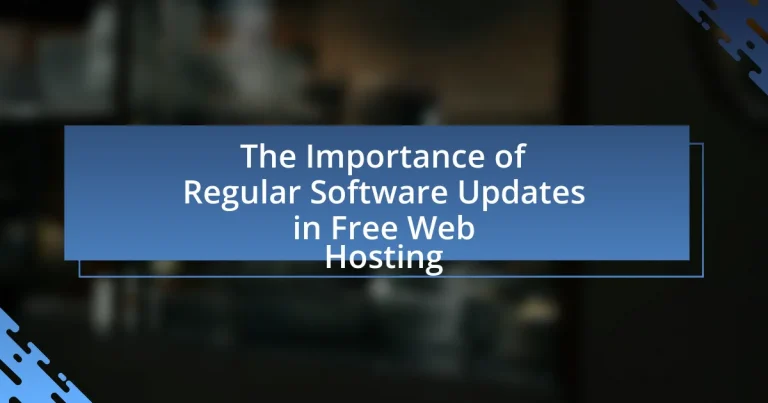Regular software updates in free web hosting are essential for ensuring security, performance, and compatibility. These updates address vulnerabilities that could be exploited by cyberattacks, significantly reducing the risk of data breaches. Additionally, they enhance website performance by optimizing load times and improving user experience, while also ensuring compatibility with the latest web technologies. Neglecting these updates can lead to serious security risks, degraded performance, and functionality issues, making them a critical aspect of effective free web hosting services. The article will explore the importance of these updates, the risks associated with outdated software, and best practices for both users and providers to maintain a secure and efficient hosting environment.

What is the Importance of Regular Software Updates in Free Web Hosting?
Regular software updates in free web hosting are crucial for maintaining security, performance, and compatibility. These updates address vulnerabilities that could be exploited by malicious actors, thereby protecting user data and preventing unauthorized access. For instance, according to a report by the Cybersecurity & Infrastructure Security Agency, 85% of successful cyberattacks exploit known vulnerabilities for which patches are available. Additionally, updates often enhance the performance of hosting services, ensuring faster load times and improved user experience. Compatibility with the latest web technologies is also ensured through regular updates, which helps maintain the functionality of websites hosted on these platforms. Therefore, neglecting software updates can lead to security breaches, degraded performance, and compatibility issues, making them essential for effective free web hosting.
Why are software updates crucial for free web hosting services?
Software updates are crucial for free web hosting services because they enhance security, improve performance, and ensure compatibility with new technologies. Regular updates protect against vulnerabilities that can be exploited by cyberattacks, as evidenced by the fact that 60% of data breaches are linked to unpatched software. Additionally, updates often include performance optimizations that can lead to faster loading times and better user experiences, which are essential for retaining users on free platforms. Lastly, keeping software up-to-date ensures that hosting services remain compatible with the latest web standards and technologies, which is vital for maintaining functionality and user satisfaction.
What risks are associated with outdated software in free web hosting?
Outdated software in free web hosting poses significant risks, including security vulnerabilities, compatibility issues, and performance degradation. Security vulnerabilities arise because outdated software often lacks the latest patches that protect against known exploits; for instance, a study by the Ponemon Institute found that 60% of data breaches are linked to unpatched vulnerabilities. Compatibility issues can occur when outdated software fails to support newer technologies or applications, leading to functionality problems. Additionally, performance degradation can result from outdated software not being optimized for current web standards, which can slow down website loading times and negatively impact user experience.
How do software updates enhance security in free web hosting?
Software updates enhance security in free web hosting by patching vulnerabilities and fixing bugs that could be exploited by attackers. Regular updates ensure that the hosting environment is equipped with the latest security features and protocols, which are essential for protecting sensitive data and maintaining system integrity. For instance, according to a report by the Cybersecurity & Infrastructure Security Agency, timely software updates can reduce the risk of cyber incidents by up to 85%. This demonstrates that consistent application of updates is crucial for safeguarding free web hosting services against emerging threats.
What are the benefits of regular software updates for users?
Regular software updates provide users with enhanced security, improved performance, and access to new features. These updates often patch vulnerabilities that could be exploited by cyber threats, thereby protecting user data and privacy. For instance, a report by the Cybersecurity & Infrastructure Security Agency (CISA) indicates that 85% of successful cyberattacks exploit known vulnerabilities for which patches are available. Additionally, updates can optimize software efficiency, leading to faster load times and better resource management. Furthermore, users benefit from new functionalities that enhance usability and overall experience, as software developers continuously refine their products based on user feedback and technological advancements.
How do updates improve website performance and reliability?
Updates improve website performance and reliability by optimizing code, fixing bugs, and enhancing security features. Regular updates ensure that the website runs on the latest technology, which can lead to faster load times and reduced downtime. For instance, a study by Google found that a one-second delay in load time can lead to a 20% decrease in conversions, highlighting the importance of performance optimization through updates. Additionally, updates often patch vulnerabilities that could be exploited by attackers, thereby increasing the site’s reliability and user trust. According to the Cybersecurity & Infrastructure Security Agency, 85% of successful cyberattacks exploit known vulnerabilities, underscoring the critical role of updates in maintaining security and reliability.
What role do updates play in user experience and satisfaction?
Updates significantly enhance user experience and satisfaction by improving functionality, security, and performance. Regular updates address bugs and vulnerabilities, which can lead to a smoother and safer user interaction. For instance, a study by the Ponemon Institute found that 60% of data breaches are linked to unpatched vulnerabilities, highlighting the importance of updates in maintaining user trust and satisfaction. Additionally, updates often introduce new features that can enhance usability, making the software more appealing and efficient for users. Thus, consistent updates are crucial for fostering a positive user experience and ensuring ongoing satisfaction.

How do software updates impact the overall functionality of free web hosting?
Software updates significantly enhance the overall functionality of free web hosting by improving security, performance, and compatibility. Regular updates address vulnerabilities that could be exploited by malicious actors, thereby protecting user data and maintaining service integrity. For instance, a study by the Ponemon Institute found that 60% of data breaches are linked to unpatched vulnerabilities, underscoring the necessity of timely updates. Additionally, updates often optimize server performance, leading to faster load times and better user experiences, which are critical for retaining visitors. Compatibility with new technologies and standards is also ensured through updates, allowing free web hosting services to remain relevant and functional in a rapidly evolving digital landscape.
What features are commonly improved through software updates?
Software updates commonly improve security, performance, user interface, and compatibility. Security enhancements address vulnerabilities, reducing the risk of breaches; for instance, a 2020 report by Cybersecurity Ventures projected that cybercrime would cost the world $10.5 trillion annually by 2025, highlighting the importance of security updates. Performance improvements often optimize resource usage, leading to faster load times and better responsiveness, which can be crucial for user retention. User interface updates enhance usability, making applications more intuitive and accessible, thereby improving user experience. Compatibility updates ensure that software works seamlessly with new hardware and other software, which is essential as technology evolves rapidly.
How do updates affect compatibility with plugins and themes?
Updates can significantly affect compatibility with plugins and themes by introducing changes that may render them incompatible. When a core software update occurs, it can alter the underlying code structure, APIs, or functionalities that plugins and themes rely on, leading to potential conflicts or malfunctions. For instance, a major update in a content management system like WordPress can break older plugins that have not been updated to align with the new code standards or features. This is evidenced by the fact that according to a 2021 study by WP Engine, 60% of WordPress users experienced plugin conflicts after a major update, highlighting the importance of ensuring that both plugins and themes are regularly updated to maintain compatibility.
What enhancements can users expect from regular updates?
Users can expect improved security, enhanced performance, and new features from regular updates. Regular updates address vulnerabilities, reducing the risk of cyber threats, as evidenced by the fact that 60% of data breaches are linked to unpatched software. Additionally, updates often optimize system performance, leading to faster load times and better resource management. New features introduced in updates can enhance user experience and functionality, keeping the software competitive and aligned with user needs.
How can users ensure they receive timely software updates?
Users can ensure they receive timely software updates by enabling automatic updates in their software settings. Automatic updates allow the software to download and install updates as soon as they are released, minimizing the risk of missing critical patches. According to a study by the Cybersecurity & Infrastructure Security Agency, timely updates can reduce vulnerabilities by up to 85%, highlighting the importance of staying current with software versions. Additionally, users should regularly check for updates manually if automatic updates are not available, as this practice helps maintain software security and functionality.
What should users look for in a free web hosting provider regarding updates?
Users should look for a free web hosting provider that offers regular software updates to ensure security and performance. Regular updates protect against vulnerabilities, as outdated software can be an easy target for cyberattacks. For instance, a study by the Ponemon Institute found that 60% of data breaches are linked to unpatched vulnerabilities. Additionally, providers that maintain up-to-date software typically offer better performance and reliability, as they incorporate the latest features and optimizations. Therefore, users should prioritize providers that have a clear update policy and a history of timely updates.
How can users manually check for updates in their hosting environment?
Users can manually check for updates in their hosting environment by accessing the control panel provided by their hosting service. Most hosting providers, such as cPanel or Plesk, include a section dedicated to software updates where users can view available updates for their applications, plugins, and the server itself. This functionality is crucial as it allows users to ensure their software is up-to-date, thereby enhancing security and performance. Regularly checking for updates is essential, as outdated software can lead to vulnerabilities that may be exploited by malicious actors.

What challenges do free web hosting services face regarding software updates?
Free web hosting services face significant challenges regarding software updates due to limited resources and funding. These services often lack the financial backing necessary to maintain a dedicated team for regular updates, which can lead to outdated software that is vulnerable to security threats. For instance, a study by the Ponemon Institute found that 60% of data breaches are linked to unpatched vulnerabilities, highlighting the risks associated with infrequent updates. Additionally, the reliance on open-source software can complicate the update process, as these services may not have the expertise to implement necessary patches effectively. Consequently, the combination of resource constraints and technical limitations makes it difficult for free web hosting services to ensure their software remains current and secure.
What are the common obstacles to implementing regular updates?
Common obstacles to implementing regular updates include resource constraints, lack of technical expertise, and resistance to change. Resource constraints often manifest as limited budgets or insufficient personnel, hindering the ability to allocate time and funds for updates. Lack of technical expertise can prevent teams from effectively managing and executing updates, leading to outdated software. Resistance to change arises when stakeholders are hesitant to adopt new systems or processes, fearing disruption or unfamiliarity. These factors collectively impede the timely and effective implementation of necessary software updates in free web hosting environments.
How do resource limitations affect update frequency in free hosting?
Resource limitations significantly reduce update frequency in free hosting services. These limitations often include restricted bandwidth, storage, and processing power, which can hinder the ability to deploy updates promptly. For instance, if a free hosting provider allocates minimal server resources, the time required to implement updates increases, leading to delays. Additionally, many free hosting platforms prioritize stability over frequent updates to avoid service disruptions, further impacting the regularity of software updates. Consequently, users may experience outdated software, which can expose them to security vulnerabilities and performance issues.
What security concerns arise from delayed updates in free web hosting?
Delayed updates in free web hosting lead to significant security concerns, primarily due to the increased vulnerability to cyberattacks. When software is not updated regularly, known security flaws remain unpatched, allowing hackers to exploit these weaknesses. For instance, a study by the Ponemon Institute found that 60% of data breaches are linked to unpatched vulnerabilities. Additionally, outdated software can become incompatible with security protocols, further exposing hosted websites to threats such as malware infections and data breaches. Therefore, the lack of timely updates in free web hosting environments directly correlates with heightened risks of unauthorized access and data loss.
What strategies can free web hosting providers adopt to improve update processes?
Free web hosting providers can improve update processes by implementing automated update systems. Automation reduces the manual workload and ensures timely updates, which is critical for security and performance. For instance, a study by the Cybersecurity & Infrastructure Security Agency (CISA) highlights that automated updates can significantly decrease vulnerabilities by ensuring that software is consistently up-to-date. Additionally, providers can adopt a version control system to track changes and roll back updates if issues arise, enhancing stability. Regular communication with users about upcoming updates can also foster transparency and user trust, as noted in user experience research by Nielsen Norman Group.
How can automation play a role in managing software updates?
Automation can significantly streamline the management of software updates by enabling scheduled updates, reducing manual intervention, and minimizing human error. Automated systems can check for updates, download them, and apply them at predetermined intervals, ensuring that software remains current without requiring constant oversight. For instance, tools like Ansible and Puppet allow for the automated deployment of updates across multiple servers, which is particularly beneficial in free web hosting environments where resources may be limited. This approach not only enhances security by promptly addressing vulnerabilities but also improves system performance by ensuring that the latest features and optimizations are implemented.
What best practices should providers follow to ensure effective updates?
Providers should implement a structured update schedule to ensure effective updates. This involves regularly assessing software for vulnerabilities, applying patches promptly, and testing updates in a controlled environment before deployment. Research indicates that organizations that follow a systematic update protocol reduce security risks by up to 80%, as highlighted in the 2021 Cybersecurity Report by CyberEdge Group. Additionally, maintaining clear communication with users about update schedules and potential impacts fosters trust and minimizes disruptions.
What practical tips can users follow to manage software updates effectively?
To manage software updates effectively, users should enable automatic updates whenever possible. This ensures that the latest security patches and features are installed without manual intervention, reducing the risk of vulnerabilities. Additionally, users should regularly check for updates on critical software that may not support automatic updates, such as operating systems and applications. According to a report by the Cybersecurity & Infrastructure Security Agency, 60% of breaches involve unpatched vulnerabilities, highlighting the importance of timely updates. Users should also back up their data before applying updates to prevent data loss in case of issues during the update process.
How can users stay informed about the latest updates and patches?
Users can stay informed about the latest updates and patches by subscribing to official newsletters and following relevant social media channels of the software or service providers. Many companies release information about updates through these channels, ensuring users receive timely notifications. Additionally, users can regularly check the official websites or forums dedicated to the software, where changelogs and announcements are often posted. For instance, major software platforms like WordPress and Joomla maintain dedicated sections for updates, providing users with detailed information on the latest patches and enhancements.
What steps should users take to back up their data before updates?
Users should take the following steps to back up their data before updates: first, they should identify the data that needs to be backed up, including files, databases, and configurations. Next, users should choose a reliable backup method, such as using cloud storage services like Google Drive or Dropbox, or external hard drives for local backups. After selecting the method, users should execute the backup process, ensuring that all critical data is copied successfully. Finally, users should verify the integrity of the backup by checking that the files are accessible and intact. This process is essential because it minimizes the risk of data loss during software updates, which can sometimes lead to unexpected issues or failures.


